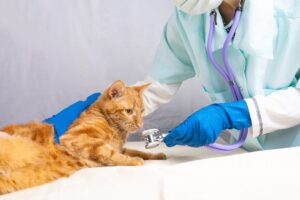
In honor of Immunization Awareness Month, let’s discuss the FeLV vaccine in more detail.
Feline leukemia virus, or FeLV, is a virus that infects only cats. It depresses cats’ immune systems, and they remain infected for life. FeLV is a critical cause of anemia in felines and may cause multiple types of cancers. In honor of Immunization Awareness Month, let’s discuss the FeLV vaccine in more detail.
What is the Feline Leukemia Virus?
Feline leukemia virus (FeLV) is found globally and can be transmitted via a bodily fluid exchange, like sharing a water bowl, or from mama to kitty. Unfortunately, FeLV invades and replicates in cells inside the cat’s immune system and tissues that make blood cells. It’s considered one of the most common infectious diseases in the world and can result in cancers such as lymphoma and leukemia.
Signs and Symptoms of FeLV
Unvaccinated cats that are exposed to other cats with unknown status are at risk of contracting FeLV. Watch out for the following signs of FeLV:
- Appetite loss
- Progressive weight loss
- Constant fever and diarrhea
- Poor coat condition
- Enlarged lymph nodes
- Pale gums
- Infections of the cat’s urinary bladder, skin, and upper respiratory tract
- Inflammation of the gums and mouth
- Eye conditions
- Reproductive failure
- Seizures, behavior, and other neurological disorders
Diagnosis
Particular blood exams have been developed to detect the presence of FeLV in a cat’s blood. These examinations are generally reliable and rarely yield false positive results. With a few drops of blood, your veterinarian can run a test during your cat’s exam to determine if he or she is positive for FeLV. In some situations, confirming the infection by repeating blood testing or through alternate testing types might be necessary.
A blood exam is highly recommended for most cats before the FeLV vaccine to determine whether a cat has already been infected with the virus.
Treatment
There is, unfortunately, no cure for feline leukemia. Cats with FeLV can be treated symptomatically to help with secondary infections or associated anemia. However, FeLV vaccines help prevent virus infection and control FeLV-related diseases. No vaccine is 100% protective, so you still shouldn’t allow your cat or kitten to come into close contact with cats of unknown vaccination history or FeLV-infected cats when possible.
The Importance of Vaccinating Your Cat
Aside from eliminating exposure, vaccinating your feline is the only way to protect your cat from diseases like FeLV. Vaccines work by training your cat’s immune system to recognize and remove infectious agents. When your cat encounters an agent in the future, its immune system will quickly generate antibodies and activate cells to destroy the agent. This prevents your cat from experiencing infection and becoming ill from the disease. Ask your veterinarian at Mount Carmel Animal Hospital if your cat would benefit from the FeLV vaccine.
HERE AT MOUNT CARMEL ANIMAL HOSPITAL, WE’LL TREAT YOUR PETS LIKE FAMILY!
Mount Carmel Animal Hospital has been serving the Northern Baltimore/Southern York community for over 30 years and is proud to be an independently operated, small animal practice committed to excellence in veterinary medicine and client service. From grooming to wellness services, along with Canine Life Skills Training Courses, and surgical procedures, we have the expertise that will best serve the needs of you and your pet. Contact us at 410-343-0200 and follow us on Facebook
